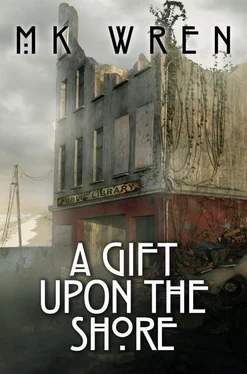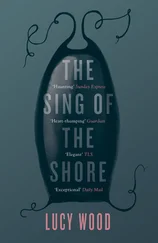And beyond the window, the night raged. It had its own pulse.
Mary had to think about that sound, and she found it acidly ironic that it was only the howling, lashing roar of the storm that had swept in from the horizon where it lurked this afternoon.
It was only the storm.
At this moment she had no proof that anything worse than a sou’wester had occurred beyond the sealed windows.
No proof except a watch that had stopped—along with every electrical appliance in the house—and the fact that Jim’s radio, the one that had been stored in the basement in its lead-sheathed box, had offered nothing but stuttering hisses of static.
And the fear and despair that finally came into focus in her mind shook her body, choked off her breath while she strained to stop a cry.
Why ?
That was the word she wanted to shriek against the hammering of the storm. But she held it back, because she felt Rachel trembling, too. They clung to each other as if each were paradoxically both the drowning victim and the rescuer. And Rachel said in a sibilant whisper, “Those ignorant, arrogant bastards! ”
Mary didn’t attempt a response to that. She knew that anything she tried to say would come out in a scream of rage and chagrin.
It would be a long night, and she wondered how they would know when it was over.
And yet, hope pursues me; encircles me, bites me; like a dying wolf tightening his grip for the last time.
—FEDERICO GARCIA LORCA,
DOÑA ROSITA (1935)

Like all our meals, breakfast is served at the long cedar table in the dining room. There are thirteen of us at the table; enough for a coven. Today we are treated to eggs scrambled with goat cheese, and I am treated to a duet by Little Mary and Deborah, since I missed their debut as a vocal duo at morning service. They sing “Jesus Wants Me for a Sunbeam” with enthusiasm and an attempt at harmony on Mary’s part. I respond with applause and words of praise. I’m always glad to hear the children make music, whatever the message in the lyrics. And I like to believe they respond to the music more than the message.
Miriam, of course, values the message above the music, and while the girls sing, she watches me as if to be sure I get that point. I smile and after the duet tell her how sweetly the girls’ voices blend.
An hour later the same table serves for another activity: school. Six days a week, three hours a day, the time determined by the Seth Thomas, the only timepiece that still works. I’m not sure how accurate it is by now.
I have the children for these three hours because I once made a bargain with Jerry.
So, again I sit at the table with my children waiting. My children. At least, when it comes to their education, their humanization, they’re mine. I look at them and think how beautiful they are, as simple and as accessible as the iridescent skin of a soap bubble, and as fragile.
I sit at the west end of the table with the blackboard on one of Rachel’s easels behind me, and in my hand is a precious stump of chalk. There’s one box of pastels left, but I’m always trying pieces of soft stone as a substitute. None I’ve found so far have worked. Nor have I found substitutes for paper and pencils for the children’s use. What little paper is left I hoard like a Scrooge. Enid and Bernadette are allotted a share of the precious sheets, but only the machine-made notebook or typing paper. Still, that suffices for Enid’s garden and livestock breeding records, and for Bernadette’s formulas for her herbal medicines. The pencils are long gone, but there’s still some of Rachel’s India ink, and we make a passable ink from twinberries.
Instead of paper, the children use slates of sorts—small rectangles of untempered Masonite that Rachel had prepared for encaustics. The smooth, white gesso ground takes well the marks of the vine maple charcoal sticks I make, for which Enid knits minuscule sleeves to keep the children’s fingers clean. Enid considers cleanliness next to godliness, but the children blithely smear their hands and even their faces with charcoal every day. But it’s easily removed, godly cleanliness restored.
Jonathan sits on my right today. He’s fourteen, Jerry and Miriam’s first child, and inbreeding has shown no deleterious effects in him. He is in every way his father’s son, even to Jerry’s tendency to naiveté and his intrinsic dependability. And like Jerry, Jonathan isn’t particularly good at reading and verbalization; his forte is mathematics, and in that he’ll soon surpass me.
Isaac sits next to Jonathan, his half-brother. My sweet Isaac with his asthma and club foot. He’s a little slow mentally, and I don’t expect much of him in school. I’m just glad to have him here, this loving, fey child. He teaches me, I think, more than I can teach him.
On my left, Stephen occupies his usual seat. My scholar, my hope for the future of humankind—or this small colony of humankind. He is also the family’s hope genetically. His father was an Arkite, so he carries neither Miriam’s nor Jerry’s genes. All the other children do, and sooner or later, that will cause problems.
But sooner or later, this colony will find other survivors or be found by them. That’s inevitable. And necessary, although I wonder if the family will survive discovery intact. Yet change is also inevitable.
Next to Stephen on my left is Little Mary, Stephen’s half-sister. She has Jerry’s blue eyes and brown hair, but her skin is darker. Mary is eight, the first child born at Amarna, and Esther named her for me. An honor, I know, but I hope she won’t have to be called Little Mary too many more years. Probably not. She’s not a scholar like her brother, but she’s extraordinarily adept with her hands. Now she’s drawing cats on her gessoed slate, and for an eight-year-old, her drawings catch the lithe essence of catness amazingly well.
Next to Mary is her singing partner, Deborah, who has also begun scrawling on her slate. She’s six, Miriam and Jerry’s youngest, and Miriam’s image, with her copper hair and fair skin. She’s vivacious and flirtatious as I suspect Miriam might once have been. Or wanted to be. I suppose I encourage that in Deborah even at the risk of spoiling her.
The youngest of the children isn’t here. She’s only three, and hasn’t yet become one of my children. Rebecca’s child—the one whose birth killed her. Rebecca’s last wish was that the child should be called Rachel. A fitting memorial, I think, to Rachel Morrow.
“All right, children, let’s begin.” I lean forward, pick up the damp rag in its plate in the center of the table, and hand it to Mary. “You and Deborah clean your slates. Now, today we’ll start with numbers. Specifically, the number one million. I’ve talked about millions of things before, but do any of you really know what a million is?”
Jonathan responds, “It’s a one with six zeros after it.”
“Yes. How long do you think it would take to count to a million?”
“You mean by ones? Well, it’d take a long time. Maybe a couple of hours.”
“Let’s see if we can figure out exactly how long. First, we’ll count up to a thousand and time it by the clock.” I look at the Seth Thomas on the spool cabinet on the north wall as I rise and go to the blackboard to mark down the time. “Deborah, you start. Just count as high as you can, one number for every tick of the clock.”
Deborah only gets to twenty, then Isaac continues the count, with a few corrections, to one hundred. Mary takes it to three hundred, and Stephen and Jonathan complete it, and by then the younger ones are showing signs of boredom and agree heartily that it takes a long time just to count to a thousand. About fifteen minutes, in fact.
Читать дальше













